

It's Becoming Clear That No One Actually Read Facebook's IPO Prospectus Or Mark Zuckerberg's Letter To Shareholders. Why Facebook Clearly Belongs in the 10X Revenue Club. February 1, 2012: Attached are my thoughts on the Facebook S-1 along with some quick stabs at valuation.
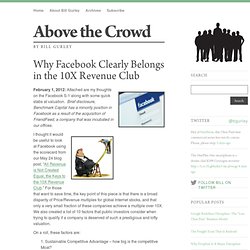
Brief disclosure, Benchmark Capital has a minority position in Facebook as a result of the acquisition of FriendFeed, a company that was incubated in our offices. I thought it would be useful to look at Facebook using the scorecard from our May 24 blog post, “All Revenue is Not Created Equal, the Keys to the 10X Revenue Club.” For those that want to save time, the key point of this piece is that there is a broad disparity of Price/Revenue multiples for global Internet stocks, and that only a very small fraction of these companies achieve a multiple over 10X. We also created a list of 10 factors that public investors consider when trying to qualify if a company is deserved of such a prestigious and lofty valuation. On a roll, these factors are: 1. So how does Facebook score on these metrics? The bottom line is that these scores are fantastic.
Tax Rate.
Facebook’s business model. Startups usually succeed because of a single major product or business innovation.
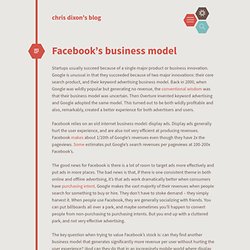
Google is unusual in that they succeeded because of two major innovations: their core search product, and their keyword advertising business model. Back in 2000, when Google was wildly popular but generating no revenue, the conventional wisdom was that their business model was uncertain. Then Overture invented keyword advertising and Google adopted the same model. This turned out to be both wildly profitable and also, remarkably, created a better experience for both advertisers and users.
Facebook relies on an old internet business model: display ads. Facebook's Goal: To Be a Blue Chip. Facebook Will Probably Be More Profitable Than Amazon This Year. In the first six months of 2011 Facebook had $1.6 billion in revenue and about $800 million in operating income, says a source I trust a lot.
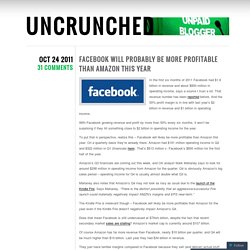
That revenue number has been reported before. And the 50% profit margin is in line with last year’s $2 billion in revenue and $1 billion in operating income. With Facebook growing revenue and profit by more than 50% every six months, it won’t be surprising if they hit something close to $2 billion in operating income for the year. Facebook puts off IPO until late 2012. Facebook is preparing to launch its blockbuster initial public offering in the US towards the end of next year, a later public debut by the social networking site than had been widely anticipated, say people familiar with the company.
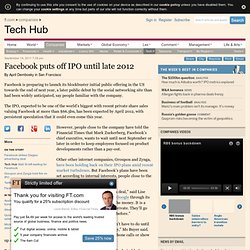
The IPO, expected to be one of the world’s biggest with recent private share sales valuing Facebook at more than $66.5bn, has been expected by April 2012, with persistent speculation that it could even come this year. However, people close to the company have told the Financial Times that Mark Zuckerberg, Facebook’s chief executive, wants to wait until next September or later in order to keep employees focused on product developments rather than a pay-out. Goldman Invests in Facebook at $50 Billion Valuation. Tony Avelar/Bloomberg NewsThe deal could double the personal fortune of Mark Zuckerberg, Facebook’s co-founder. 12:42 p.m. | Updated Goldman Sachs has reached out to its wealthy private clients, offering them a chance to invest in Facebook, the hot social networking giant that is considering a possible public offering in 2012, according to people familiar with the matter.
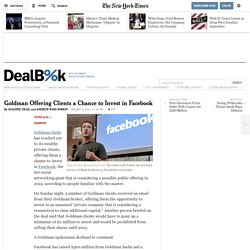
On Sunday night, a number of Goldman clients received an email from their Goldman broker, offering them the opportunity to invest in an unnamed “private company that is considering a transaction to raise additional capital.” Another person briefed on the deal said that Goldman clients would have to pony up a minimum of $2 million to invest and would be prohibited from selling their shares until 2013. I was wrong about Facebook’s valuation. Back on October 11, 2007, I wrote that Lee Lorenzen was nuts.
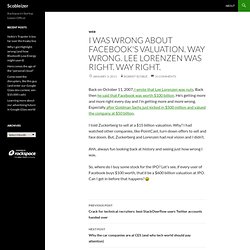
Back then he said that Facebook was worth $100 billion. He’s getting more and more right every day and I’m getting more and more wrong. Especially after Goldman Sachs just kicked in $500 million and valued the company at $50 billion. Facebook's Journey From Founding to IPO [INFOGRAPHIC] Is Facebook ready for its heavily rumored IPO next spring?
![Facebook's Journey From Founding to IPO [INFOGRAPHIC]](http://cdn.pearltrees.com/s/pic/th/facebook-founding-infographic-12977982)
With the massive growth of its staff and userbase, the huge rounds of funding it has taken and its ever-rising valuation, and the company's increasing significance in the global sphere, the startup has clearly moved into the realm of enterprise. To quickly sum up the company's journey from dorm room to Silicon Valley, we have an infographic from real-time social media startup Namesake. Click image to see full-size version. [source: Namesake Blog] Why I doubted Facebook could build a billion dollar business, and what I learned from being horribly wrong.
Facebook, early 2006Sometimes, you need to be horribly, embarrassingly wrong to remind yourself to keep an open mind.
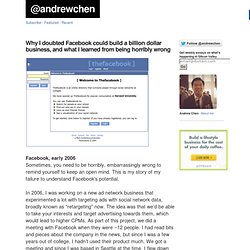
This is my story of my failure to understand Facebook’s potential. In 2006, I was working on a new ad network business that experimented a lot with targeting ads with social network data, broadly known as “retargeting” now. The idea was that we’d be able to take your interests and target advertising towards them, which would lead to higher CPMs. As part of this project, we did a meeting with Facebook when they were ~12 people. I had read bits and pieces about the company in the news, but since I was a few years out of college, I hadn’t used their product much.